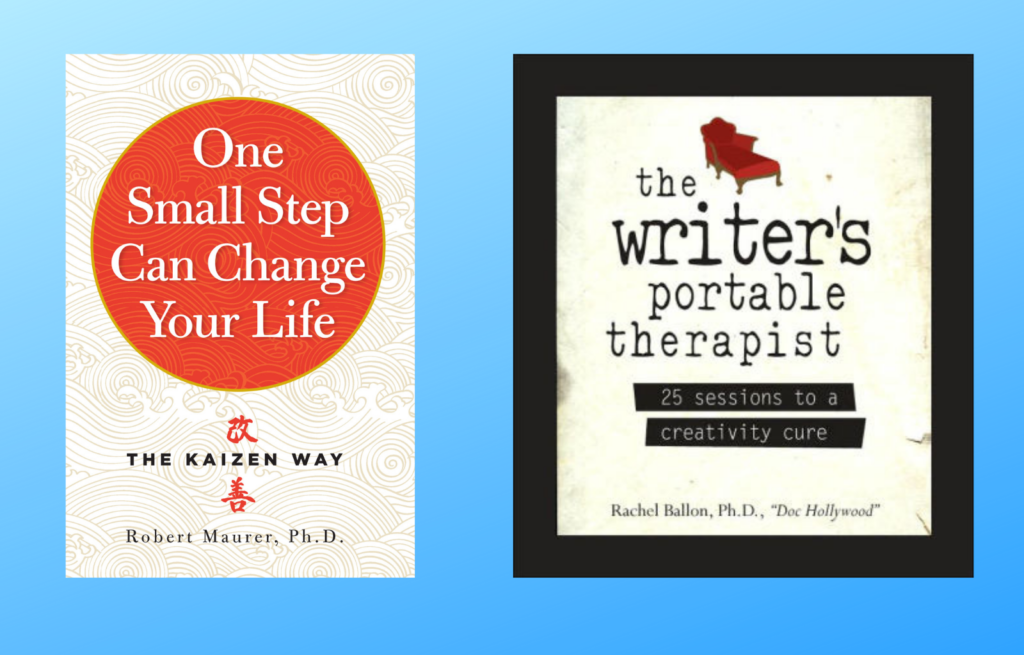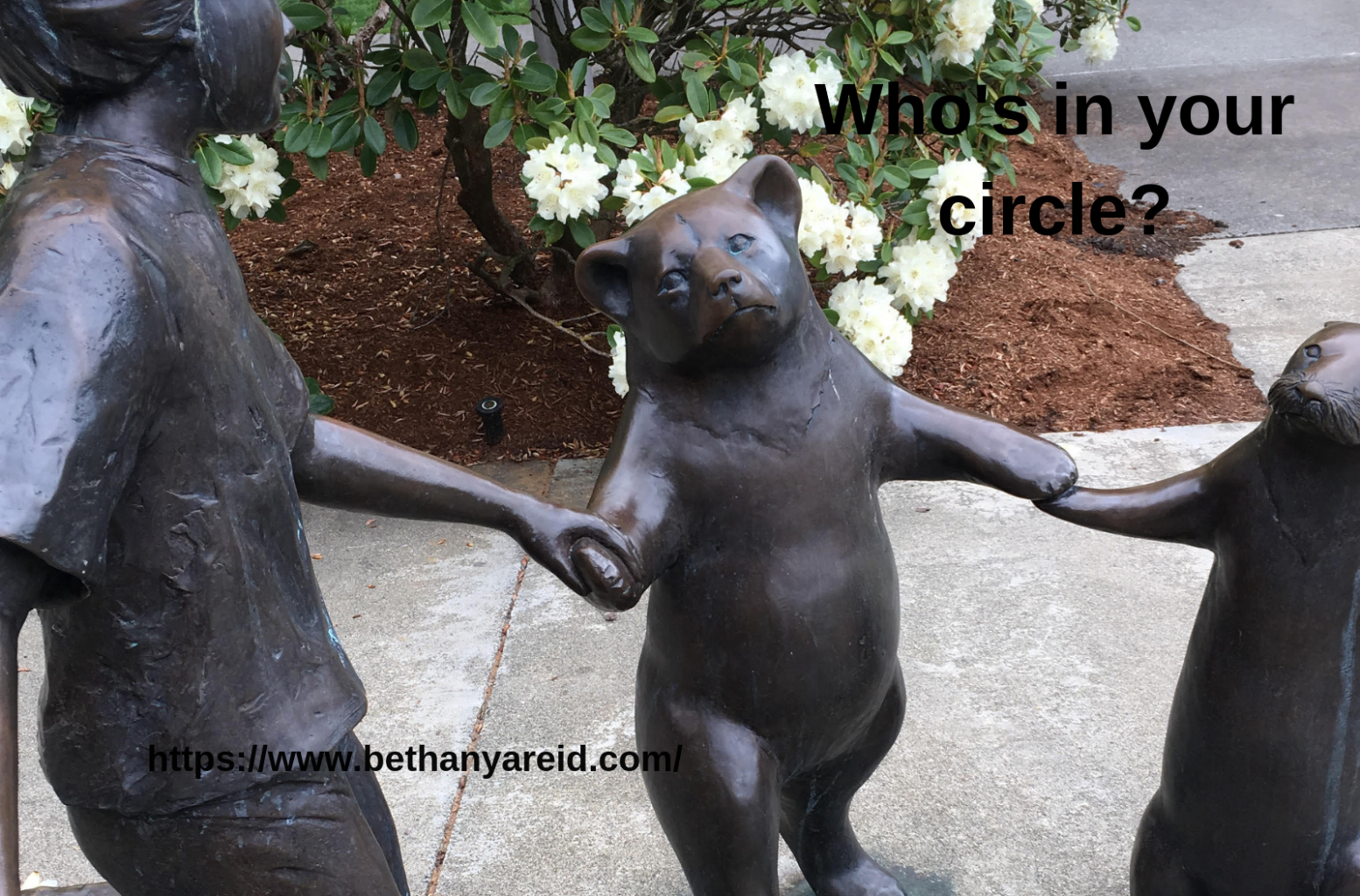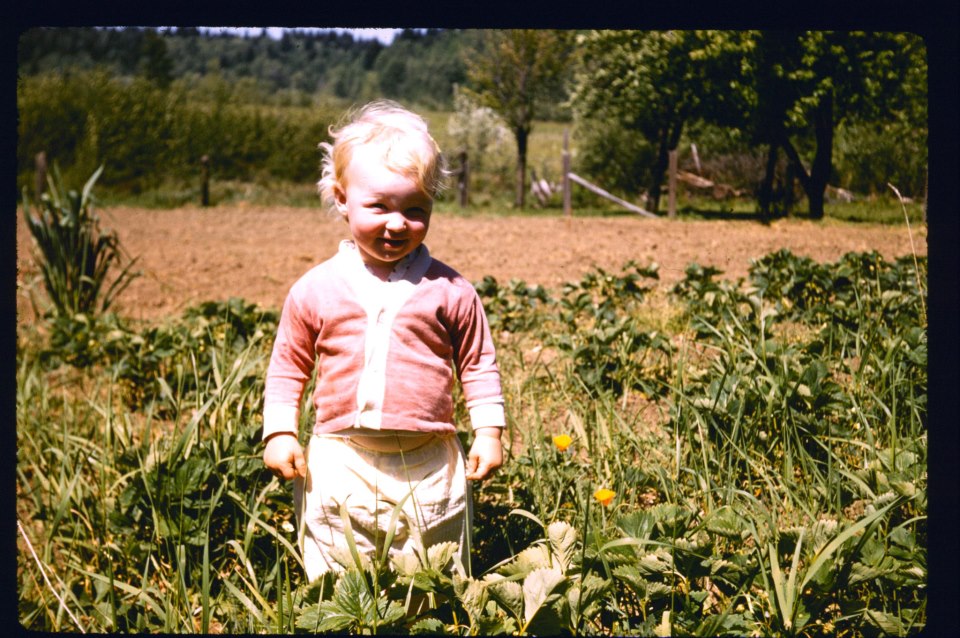“Your ability to make a choice and stick to it—your will—is your most powerful inner resource.” –Laura Day
Whether you used the last prompt as encouragement to generate 8 of your top writing wishes or 100, today’s prompt is all about choosing just one of these, for now, to focus on.
I’ve been trying to wrap my mind around this prompt for awhile, and I think part of the difficulty for me lies in a reluctance to encourage anyone to have pie-in-the-sky dreams about their writing career. Two books that have helped me with this are Rachel Ballon’s The Writer’s Portable Therapist and Robert Maurer’s One Small Step Can Change Your Life.
In short, Ballon showed me how “unrealistic expectations [can] block your creativity and prevent you from ever realizing your writing dreams,” and Maurer taught me to take on the big stuff one small–really small–step at a time.
 There’s (still) nothing wrong with your desires, by the way, no matter how large, but I want to give you a lesson now in imagining the smaller, moving parts to your desire. (Because before you can have a novel hit the best-seller list, you have to write a novel. Before you can write a novel, you have to develop a habit of writing that will sustain a long-term project.)
There’s (still) nothing wrong with your desires, by the way, no matter how large, but I want to give you a lesson now in imagining the smaller, moving parts to your desire. (Because before you can have a novel hit the best-seller list, you have to write a novel. Before you can write a novel, you have to develop a habit of writing that will sustain a long-term project.)
Even the “baby steps” can turn out to have smaller moving parts. If you need to learn how to write dialog, you’ll have to figure out the steps for how to learn to write dialog. (Buy a book? Take a class? Study authors who have killer dialog? Join a writing group and practice? All of the above?)
I learned this the hard way. If you look at my 10-year planner (or the one before that) you’ll see that I’ve been writing “Take a walk every day,” or “Be a person who walks every day” (and other variations) ever since my kids were small. For a short time I was able to muscle my way through this and actually do it, but then I missed a few days, and soon I was back to almost never taking an intentional walk.
Then I decided to make my goal of walking more specific and way, way smaller. I committed to taking a 5-minute walk each day (click on the link to read my blogpost about this), and just like Maurer promises in his book, accomplishing that small goal led me to increasing my minutes until now it’s a rare day that I don’t walk 30 or 40 minutes.
This achievement made me wonder if I couldn’t use the same strategy to move closer to one of my big writing goals, which was to write a mystery novel. (Something I’ve wanted to do since I was a kid!)
Unlike earlier attempts at writing novels, this project was not going to be open-ended. I set myself up for failure to start with by saying I’d write my mystery in a month. I had to regroup at the end of the month, but it worked to an extent–I had something tangible by the end of 40 days of writing, a working premise, a cast of characters, and about 100 pages. It was enough to give me forward momentum. Despite being a rather slow writer (and my mom…and teaching fall quarter…) I kept the project inching forward and by December 31 I had a complete if very rough draft. And on January 1, I turned my sights toward revision. I am still working on the steps: I enlisted another wannabe novelist to revise with, creating our own very small mastermind/encouragement group, and I set some interim goals (submit to PNWA in February) to motivate me.
So, to return to Laura Day, she gives very clear advice about how to word your desire in positive, present-tense, specific language, and why that’s important.
1) To start with, narrow your focus to a single wish. Yes, you can take on more, but for now you’re practicing focusing–and focus requires us to, well, focus.
Distinguish, too, between the things you can control, and the things that are better given over to God or the universe. You have no control over the whims and moods of the editors at _______ poetry journal, but you do have control over how many submissions you make this year. You have no control over whether your book will be a best-seller, but you do have control over writing the best book you are able to write.
“One of the most profound traits that distinguishes you from other animals is your ability to imagine things that do not yet exist; your ability to envision future possibilities and to choose among them; in short, your ability to create.” -Laura Day
2) State your wish in positive, present-tense language. Not, I will no longer suck at dialogue, but I write AMAZING dialogue!
Stating your wish positively simply means saying what you want, not what you don’t want. While you’re at it, you also need to give up the word “wanting.” There’s a little psychological roadblock here (think of it this way, want = lack), and I think it also has to do with our deeply engrained language patterns. In essence, I’ve come to feel that a “want” list is often a “can’t list” in disguise. I want a new car, but I can’t have one. I want to get my novel published, but it can’t…. I want to have a better marriage, but there are all these reasons that I can’t. (Wah, wah, wah!)
Of course you want it, but let’s try putting it into different language. Not I want to write a mystery novel or I want to walk every day, but–
I am writing a mystery novel.
I walk every day.
3) Finally, be specific! I’ve already addressed this above, but I want to emphasize the power of breaking your wish into smaller parts, and making it visible. Even “write a novel” is on the vague side (and so large it is more the universe’s job than yours). But you can write an outline of a novel, and then a paragraph and a page and a chapter. You can decide what sort of novel it is, who your readers are, and how long you want it to be. All of these things are specific and they’re 100% in your control.
I am revising my first chapter so I can read it aloud to my Wednesday writing group.
I’ve used this strategy, by the way, on poems, too. This summer I was invited to write a poem for an Orca anthology, and–given that my mother was dying–I just couldn’t seem to do it. But I knew that writing a single poem wasn’t an unrealistic desire, and I truly wanted to write it. So I began drawing my circle in my journal each morning and writing inside it: I am writing a poem for Tahlequah and her calf. I built that poem image by image and line by line, but I managed to workshop it with an amazing group at Litfuse, and I submitted it to the anthology editors five days prior to the deadline–and three days before my mother died. I didn’t know if they would accept it or not, but they did. The poem, as it turned out, is as much an elegy for her, as it is for the orcas, and I’m grateful that I made time for it.
Here’s your assignment:
I’m a little worried that all my qualifiers in this prompt will be discouraging. They’re not meant that way. What I wish for you is traction for your writing dreams.
Whatever you’ve come up with–this wish that you know you can turn into reality, given the focus–your job right now is to draw a circle in your journal (the bottom of a coffee cup or a lid or a round coaster work great for this), then to write your wish in that space (in positive, present-tense, specific language!). You may want to write it on another sheet of paper to post above your writing desk.
I’d love it if you’d take a picture of your circle and send it to me!
On this first time through The Circle, this is a free series, and I plan to continue with emails to a small group of subscribers, so comment below or email me at bethany.alchemy@gmail.com — I’d love to have you on the journey with me.




 My mom had a couple of stories about my early childhood — one was that I didn’t walk until I was 13 months old. “I thought you were retarded,” she liked to say.
My mom had a couple of stories about my early childhood — one was that I didn’t walk until I was 13 months old. “I thought you were retarded,” she liked to say.


 There’s (still) nothing wrong with your desires, by the way, no matter how large, but I want to give you a lesson now in imagining the smaller, moving parts to your desire. (Because before you can have a novel hit the best-seller list, you have to write a novel. Before you can write a novel, you have to develop a habit of writing that will sustain a long-term project.)
There’s (still) nothing wrong with your desires, by the way, no matter how large, but I want to give you a lesson now in imagining the smaller, moving parts to your desire. (Because before you can have a novel hit the best-seller list, you have to write a novel. Before you can write a novel, you have to develop a habit of writing that will sustain a long-term project.)